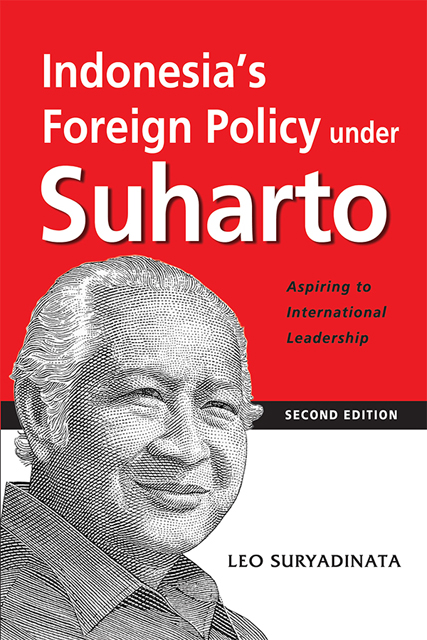Book contents
- Frontmatter
- Contents
- Preface to the Second Edition
- Preface
- Acknowledgements
- Introduction: Suharto’s Foreign Policy
- 1 Determinants of Indonesia’s Foreign Policy: In Search of an Explanation
- 2 Indonesia’s Foreign Policy before the New Order: In Search of a Format
- 3 Indonesia’s Foreign Policy during the “New Order” (I): The Rise of the Military
- 4 Indonesia’s Foreign Policy during the “New Order” (II): The Assertive Role of the President
- 5 Indonesia’s Relations with the ASEAN States: Regional Stability and Leadership Role
- 6 Indonesia’s Relations with Australia and Papua New Guinea: Security and Cultural Issues
- 7 Indonesia-China Relations: Ideology, Ethnic Chinese and the President
- 8 Indonesia-Vietnam Relations and the Kampuchean Issue: The Security Factor
- 9 Indonesia-Superpower Relations: Economic and Non-Economic Factors
- 10 Indonesia, the Middle East and Bosnia: Islam and Foreign Policy
- 11 Indonesia, the Non-Aligned Movement and APEC: In Search of a Leadership Role
- Conclusion: To Lead and Not to Be Led
- Postscript: Indonesia’s Foreign Policy from the Fall of Suharto to Joko Widodo: Still Aspiring to International Leadership?
- Bibliography
- Appendices
- Index
3 - Indonesia’s Foreign Policy during the “New Order” (I): The Rise of the Military
Published online by Cambridge University Press: 01 September 2023
- Frontmatter
- Contents
- Preface to the Second Edition
- Preface
- Acknowledgements
- Introduction: Suharto’s Foreign Policy
- 1 Determinants of Indonesia’s Foreign Policy: In Search of an Explanation
- 2 Indonesia’s Foreign Policy before the New Order: In Search of a Format
- 3 Indonesia’s Foreign Policy during the “New Order” (I): The Rise of the Military
- 4 Indonesia’s Foreign Policy during the “New Order” (II): The Assertive Role of the President
- 5 Indonesia’s Relations with the ASEAN States: Regional Stability and Leadership Role
- 6 Indonesia’s Relations with Australia and Papua New Guinea: Security and Cultural Issues
- 7 Indonesia-China Relations: Ideology, Ethnic Chinese and the President
- 8 Indonesia-Vietnam Relations and the Kampuchean Issue: The Security Factor
- 9 Indonesia-Superpower Relations: Economic and Non-Economic Factors
- 10 Indonesia, the Middle East and Bosnia: Islam and Foreign Policy
- 11 Indonesia, the Non-Aligned Movement and APEC: In Search of a Leadership Role
- Conclusion: To Lead and Not to Be Led
- Postscript: Indonesia’s Foreign Policy from the Fall of Suharto to Joko Widodo: Still Aspiring to International Leadership?
- Bibliography
- Appendices
- Index
Summary
Introduction
This chapter examines Indonesia’s foreign policy after the fall of Sukarno and the rise of the military represented by General Suharto. Both eras share many characteristics, but there are also differences. This chapter shows the continuity and change in Indonesia’s foreign policy. Special attention will be given to the decision-makers in foreign policy and their institutions, as well as the conflict between the Ministry of Foreign Affairs and the military establishment. The dominant role of the military will also be highlighted.
The Rise of the Military in Foreign Affairs
The political history of Indonesia entered a new phase known as the New Order after the 1965 coup. The army, in assuming power, became the most significant socio-political force in the country.
The involvement of the military in politics did not begin with the 1965 coup. In the 1950s, the military was already very politicized. In 1958, for example, General H.A. Nasution put forward a doctrine known as the “Middle Way”. He argued that the military “neither seek to take over the government nor remain politically inactive”. The military claimed the right to have representation in the government, legislature, and administration. This concept, defined the role of the military in both security and non-security fields and served as the origin of the dual-function (dwi fungsi) concept which is now used as the basis for military involvement in politics. In fact, the non-security role of the military continued to grow during the Guided Democracy period and, in 1965, when the Army held its first seminar, the dual function concept was formally proposed. According to this concept, the Indonesian military is both a “military force” as well as a “socio-political force”. In other words, it is legitimate for the military to be involved in both the military and political fields.
After the 1965 coup, the “socio-political” role of the Army was further refined. At the second army seminar held in Bandung in August 1966, military involvement in all aspects of Indonesian life was detailed. In fact, this was the beginning of the large-scale “militarization” process. Government positions at both national and sub-national levels were taken over by military officers. Military personnel even moved into the Ministry of Foreign Affairs.
- Type
- Chapter
- Information
- Indonesia's Foreign Policy under SuhartoAspiring to International Leadership, pp. 34 - 49Publisher: ISEAS–Yusof Ishak InstituteFirst published in: 2023



